I don’t usually talk to homeless people. But when a good friend told me about his everyday conversations with the homeless in his neighborhood, I decided to give it a try. Mostly, because they felt invisible—and I couldn’t imagine feeling like I didn’t exist.
A few months ago, while out on my daily walks, I started noticing an old man who spent much of his day sitting on the stoop of the Stone Arch Bridge. His backpack, filled with all his worldly belongings, sat next to him.
He looked weathered, beaten down. His gray, disheveled hair hung past his shoulders. He had a long beard and a full mustache. He was short and skinny; his belt barely held his pants up. And he was nearly toothless.
Propped up next to him was a cardboard sign that read, “DESTITUTE” and underneath that, “Really!” What most surprised me was that he was usually reading a book—often a very thick one.
And that’s how our conversations got started. I asked him what he was reading. “Tom Clancy,” he replied. “He’s one of my favorite authors.”
“Ever hear of Larry Bond?” I asked. “He co-wrote Red October with Clancy—and has written numerous spy stories himself.”
“Yeah,” he replied. “I’ve read his books.”
“Larry graduated from high school with me,” I said. Then I asked him, “What’s your name?”
He told me, so I shared mine. We talked a bit more and I went on my way.
Over time, we began to have regular conversations. I learned that he was originally from Minneapolis and had lots of siblings who he hadn’t seen for a long time. He was also very proud of his gypsy heritage.
As the summer wore on, he told me about his worldly travels, how much he loved Greenland, and how horseback riding brought him great joy. His favorite food was peanut butter—I’m sure because he had so few teeth.
One day I brought him a gift card from a local grocery store. He told me he wanted to buy charcoal first so he could cook some meals. He lived outdoors on the banks of the Mississippi River. “Sometimes,” he said, “The cops even bring me food and clothes.”
He was a good, kind and smart man who’d led a tough life. I’m sure not the one he imagined when he was young.
In September, he told me he wasn’t sure if he could survive another Minnesota winter. He mentioned that he’d talked to several people about getting help, but nothing was materializing. He was clearly worried.
I didn’t see him for a couple of weeks after that, partly because I was gone on vacation. But in the first week of October, I ran into him again. In a local store. When we talked, I learned he’d been in the hospital.
But the strange thing was, he looked different … not sicker, but much, much better. Instead of dragging himself into the store, he was walking tall. Like he was a man on a mission.
That’s when he told me he was leaving in two days. Heading to Florida, to help all those poor people who’d lost all their worldly goods in Hurricane Ian.
He told me that’s who he was supposed to be ministering to. And he could be "useful" because he was good at that kind of work.
When I asked how I could help, he told me he needed old tools to take with him. “Jeez,” I said, “I gave away most of mine to my kids when I moved into a condo.”
“That’s exactly what you should have done,” he replied.
I told him I’d go dig into our toolbox to see if there was something that might help—and bring it to him on the Stone Arch Bridge the next day. Fortunately, my husband found an extra power drill, screwdrivers, measuring tape and few other things.
The following afternoon, I delivered it to him on the bridge, along with a bag of food for the trip ahead. He was sitting in his usual spot, reading a book by the poet Emily Dickinson.
He had a new sign propped up: “Thank You. Goodby.” (sic) He told me he couldn’t just disappear without letting people know.
We talked a bit more about his journey ahead. He said that he really needed a carpenter’s belt, a carpenter’s pencil and a framing hammer—for several reasons. One, because he’d have the tools he’d need when he got there.
And two (of more immediate importance), because he was hitch-hiking. If he held the carpenter’s belt up along with a “Florida” sign, he was confident he’d quickly get a ride …. hopefully from others going down there to help.
I texted my husband, about possibly stopping at Home Depot to pick up the needed supplies on his way home. He did—and later that evening, we delivered them to our homeless friend.
Our final conversation was extraordinary. We talked about Emily Dickinson—and the specific verses he was looking for. We talked about Edgar Allen Poe—one of his favorite authors. He started reciting one of Poe’s poems. Then both he and Orrin were reciting from The Raven.
The next thing I knew, he pulled out a poem he’d written earlier that day and shared it with us. It was about death. I’m sure it was on his mind. But he saw the beauty in it.
I asked him when he’d be back. He said, “There’s lots to do in Florida. “
I said hopefully, “Perhaps this spring?”
He replied, “When I went to help with Hurricane Andrew and Katrina, it took much longer. I was in New Orleans for three years.”
Then he asked me, “Do you need any money for food? I have a little left on my EBT card this month and can’t carry all the groceries with me when I’m hitchhiking.”
I thanked him for his offer but politely declined it—so impressed that this man with so little was willing to share it with me.
“You’re not coming back,” I finally said. He just smiled and shrugged his shoulders.
We said our goodbyes then, giving each other air hugs and wishing each other well. Then Orrin and I left.
He stayed till the sun went down—like he always did.
The next day he was gone.







